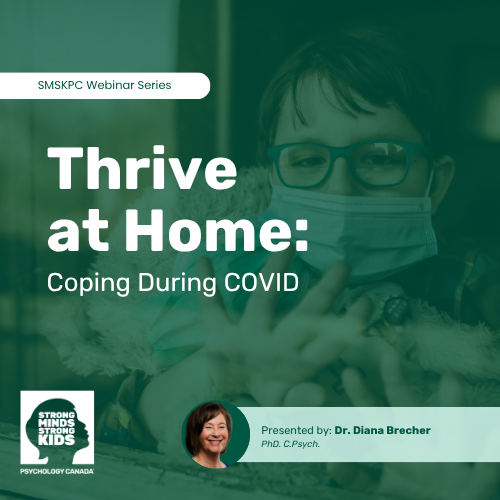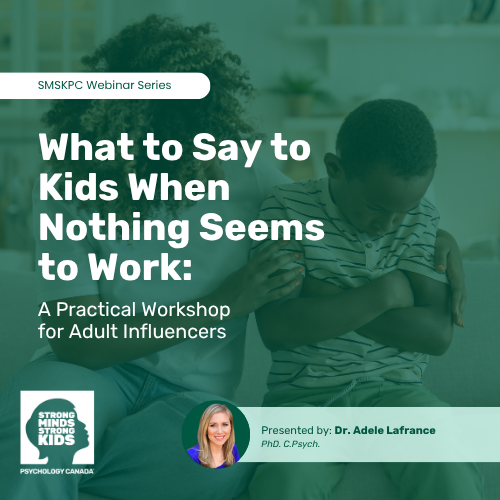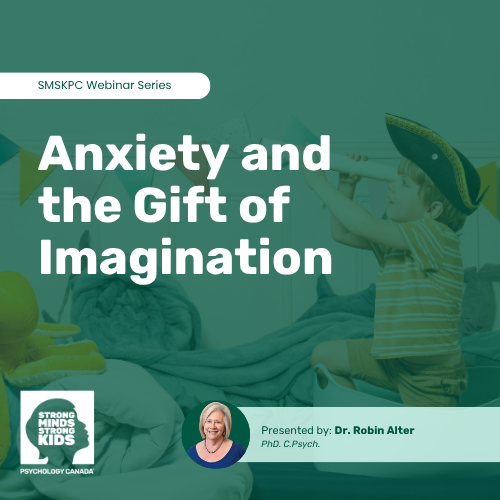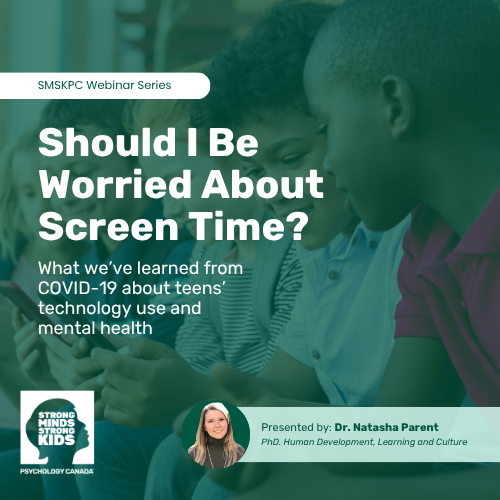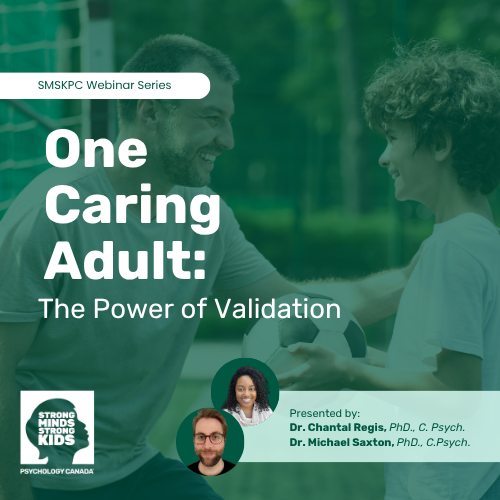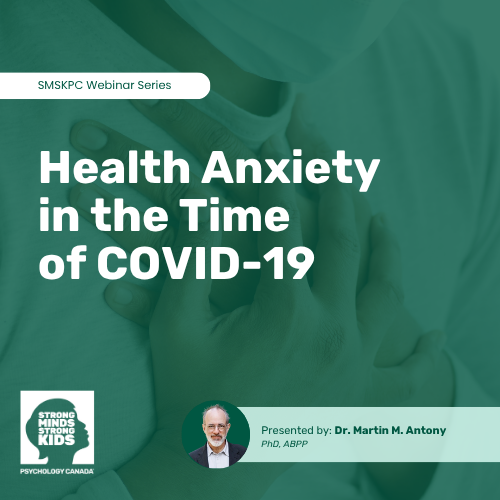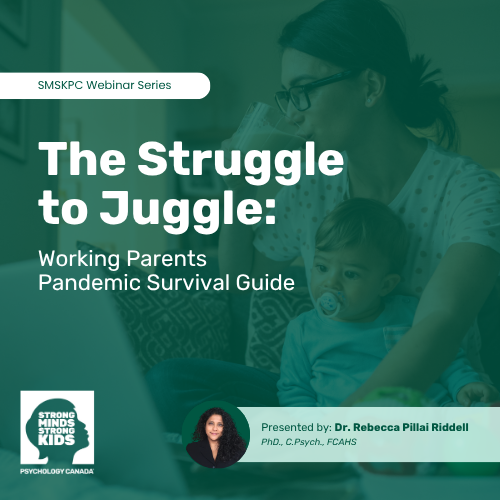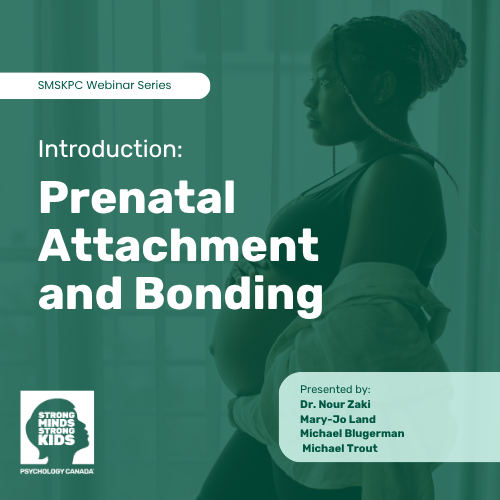Free Wellness Webinars for Parents, Caregivers, and Educators
Watch free psychology-based webinars on attachment, stress management, and resilience—packed with practical tools for home, classrooms, and community settings.
Our on-demand sessions translate psychological science into everyday strategies, from building secure attachment in the early years to helping children and teens manage stress and grow their confidence.
What are you watching today?
My Teen Has Depression: How Can I Help as a Parent/Caregiver?
by Dr. Nicolás F. Narvaez Linares.
Stress Busting ‘Magical’ Practices: Gentle Techniques for Helping Your Kids and Yourself
by Dr. Harvey Skinner
Supporting Our Children During Difficult Times – The Struggle to Juggle
by Dr. Robin Alter and Anne Murray.
Calming Your Brain to Calm Your Young Children’s Brains
by Jan Blaxall.
Secure Attachments Start Here: Make the Connection Parenting Program
by Dr. Nicole Racine and Désirée Jones.
Fostering a connection with your LGBTQ2+ youth
by Dr. Nicolás Francisco Narvaez Linares.
The Shadow Pandemic: Well-Being of Pregnant Persons, Parents, and Families During COVID-19
by Dr. Anna MacKinnon.
Thrive at Home: Coping During COVID
by Dr. Diana Brecher.
Supporting Parents During Unprecedented Times: Evidence-Based Ways to Build Resiliency
by Dr. Rebecca Pillai Riddell.
Fathers Are Parents Too, and They Matter for Children’s Development
by Dr. Audrey-Ann Deneault.
What to Say to Kids When Nothing Seems to Work: A Practical Workshop for Adult Influencers
by Dr. Adele Lafrance.
Anxiety and the Gift of Imagination
by Dr. Robin Alter.
Defining Stress and Stressors: Learning How to Support Children’s Resilience (fireside chat)
by Dr. Robin Alter and Anne Murray.
How Nature Benefits Kids and Youth
by Dr. Robin Alter.
Navigating the Digital World Safely: Helping Kids Process, Connect, and Cope Online
by Samantha Barbosa-Silva.
Every Day Strengths to Leverage Your Natural Tendencies to Reduce Personal and Professional Stress
by Tre’ Gammage.
Parenting Resilient Children and Youth at Home and at School
by Dr. Ester Cole.
Sexual Orientation and Gender Identity Inclusivity: Building Resilience and Well-Being in Youth
by Scout Gray and Ashleigh Yule.
Navigating ADHD: Unpacking Myths, Realities, and Practical Support for Neurodiverse Children and Youth
by Dr. Nicolás F. Narvaez Linares.
Supporting Teen Resilience: What Adults Need to Know
by Dr. Chantal Regis, Dr. Michael Saxton, and Youth Advisory Council members Jadah, Joelle, and Daniella.
A Relaxed Brain Is the Most Comfortable Pillow: The Value of Sleep for Children and Adolescents
by Dr. Brent Macdonald.
Indigenous Health and Well-Being: Considerations for Working with Youth
by Dr. Michelle Aihina Inkinsh and Holhpokunna Johnson-Jenning.
Empowering Teens: Understanding the Role of Need Satisfaction in Smartphone and Social Media Use
by Dr. Natasha Parent.
Should I Be Worried About Screen Time? Teens’ Technology Use and Mental Health
by Dr. Natasha Parent.
One Caring Adult: The Power of Validation
by Dr. Chantal Regis and Dr. Michael Saxton
“Be Gentle with Yourself!” Building self-compassion with children and adolescents
by Dr. Kofi-Len Belfon
Supporting Young Child Resilience Through Vaccination: Using Science to Manage Needle-Related Pain And Distress
by Mary-Jo Land, Dr. Nour Zaki, Michael Blugerman, and Michael Trout
How to Support Our Kids with Special Needs During the COVID-19 Outbreak
by Dr. Robin Alter
Health Anxiety in the Time of COVID-19
by Dr. Martin M. Antony
Stress Busters: “Magical” Practices for children and youth
by Dr. Nicolás Francisco Narvaez Linares.
The impact of anti-black racism on children and youth in Canada
Dr. Kofi-Len Belfon and Nigel Enniss
The Good Fight
by Dr. Liane Davey
Supporting Secure Attachment and Positive Parent-Child Relationships
by Dr. Mary Motz
Guilt, grief, and grace, oh my: Parenting during a Pandemic
by Dr. Amanda Zelechoski and Dr. Lindsay Malloy
Life, Interrupted: From a ‘Cancel’ to “Can Do’ Mindset During the Pandemic
by Dr. Nasreen Khatri
A Parent’s Guide to Staying Sane During COVID-19 Pandemic
by Dr. Steven Stein
Part 1: Gentle Techniques to Help Calm Your Kids
by Dr. Harvey Skinner
Calming the Commotion
by Mary-Jo Land.
The Struggle to Juggle: Working Parents Pandemic Survival Guide
by Dr. Rebecca Pillai Riddell
Part 2: Stress Busting Techniques for Youth & Young Adults
by Dr. Harvey Skinner
How to Support Our Kids During the COVID-19 Outbreak
by Dr. Robin Alter.
Being Alone Together The Social Pandemic of Loneliness during COVID-19
by Dr. Nasreen Khatri
Introduction to Prenatal Attachment and Bonding
by Mary-Jo Land, Dr. Nour Zaki, Michael Blugerman, and Michael Trout
KEEP LEARNING WITH OUR EVIDENCE-INFORMED PROGRAMS:
ATTACHMENT: AGES 4-18
Strong early bonds set the stage for lifelong well-being. Explore Make the Connection for everyday ways to nurture secure attachment in the first years, with simple activities for home and community settings.
STRESS MANAGEMENT: AGES 4-18
Help children and teens recognize stress, build healthy coping skills, and bounce back after challenges. Our Stress Lessons and Kids Have Stress Too! resources include ready-to-use lessons, handouts, and facilitator guides.
CAPACITY BUILDING: AGES 10-18
Grow resilience one small habit at a time. ThriveLandia offers practical activities in mindfulness, gratitude, optimism, self-compassion, and perseverance for youth, parents, and educators.
Webinar’s F.A.Q.
-
Yes. All sessions in this library are available at no cost.
-
Parents and caregivers, educators and youth-serving professionals, and young people themselves. Content aligns with your three pillars: Attachment, Stress Management, and Capacity Building.
-
Yes. Webinars draw from our psychology-based programs, including Make the Connection, Stress Lessons, Kids Have Stress Too!, and ThriveLandia.
-
Many webinars include practical strategies and handouts you can apply at home, in class, and in the community.
From tip sheets and booklets to webinars, activity guides, and digital tools, our free resource library helps adults and kids alike take action on mental health, one small step at a time.
Looking for extra tools?
Don’t Miss What’s Next
Sign up for inspiring stories, new program launches, free resources, and updates from our community of resilient kids and committed adults.
WANT A SNEAK PEEK?
CLICK TO VIEW PAST ISSUES










